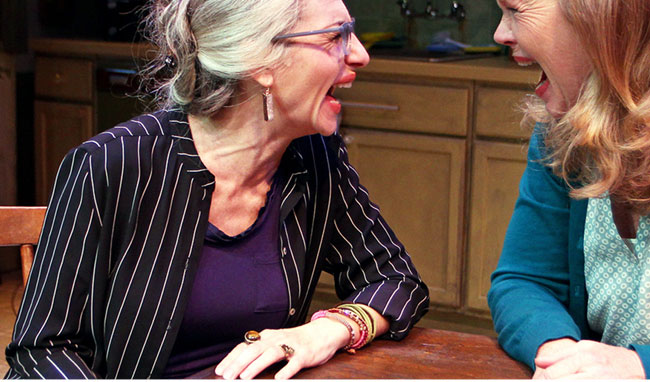
How do people change? Can they transform themselves? Is there a singular moment? Or does change occur as a series of events? Could it be caused by a particular person? Playwright Jen Silverman was inspired by the notion of how and why we evolve. “I’ve been particularly interested in stories of how people transform themselves, or in people who are drawn or driven to a point in their lives where no choice is left to them but self-transformation.” In The Roommate, a pair of characters find that the table that’s propped up their lives has been overturned. Whether they or someone else pushed it over, what happens next?
Sharon has long since resigned herself to living the version of life she was told to want. She got married, raised a child and kept a warm home in the heartland of Iowa. In her mid-50s, she’s suddenly “retired” from her marriage. As she’s done her whole life, she vows to make the best of it, and advertises for a roommate to help make ends meet. Sharon’s careful, though—she specifies that she’s seeking a woman in her 50s. That way she’ll surely avoid dangerous drug addicts or serial killers and get someone like herself. Or maybe like one of the ladies in her book club.
Hilarity ensues as Sharon gets more than she bargained for when she rents the room to Robyn. Robyn couldn’t be more different. She’s a lesbian, a vegan, and was most recently living in the Bronx. Perhaps most shocking, she drinks almond milk in the middle of cow country. Within the first 10 minutes after Robyn moves in, Sharon finds that this is not the person she imagined as her new roommate. But far from being deterred, Sharon comes to relish her discoveries of their different perspectives, and begins to experiment with Robyn’s foreign (and forbidden) ways of life—which, as a sheltered recent divorcee, she finds thrilling. The problem is that Robyn’s looking for a fresh start with a clean slate, and is trying desperately to put her former life away for good.
These opposing views of transformation—Sharon’s dictated by the circumstance of her divorce and Robyn’s by her drive to forge a new path—are muddied by the fast friendship that forms between the two seeming opposites. Silverman describes the dichotomy between Robyn and Sharon in the play as an illustration of her “warring desires.” Both characters embody things Silverman craves. On one hand, admits the playwright, “I’m attracted to Sharon’s deep roots and a sense of place that feels like it was made to contain me. But on the other hand, I identify with Robyn’s craving for constant adventure and transformation.”
In The Roommate, Silverman also wanted to create a play for older women, to write the sort of meaty roles she wasn’t seeing on stages for actresses past the ingénue phase. “I realized that when I went to the theatre I wasn’t seeing roles in which older women were total badasses,” she explains. “I was seeing roles where older women were waiting for their children to come home, or older women were watching their husbands sleep with younger women. The audience was being invited to laugh at them in a way that felt kind of suspicious to me. I wanted to give them something to do that I knew they would rock, and that I wasn’t seeing them being asked to do.” This also informed her choice for the play to focus upon two characters. Silverman notes, “I wanted to see these women at center stage in a way that a large ensemble piece might not allow them to be.” Sharon and Robyn, in the writer’s words, “have very active, vibrant, and dangerous lives. They make decisions that require a lot of boldness and recklessness, out of both desperation and desire for life.” Silverman plays with the stereotype of the sequestered Midwestern housewife by subverting the path you’d expect Sharon to take. Ironically, Robyn accidentally exposes Sharon to a new way of seeing the world, even as she’s been trying to find the settled normalcy that was the fabric of Sharon’s quiet life.
It’s a neat trick that Silverman finds both the comedy and the pathos in Sharon and Robyn’s relationship. The playwright describes their closeness as “triggered by humor.” As they get to know each other and start letting their guard down, one of them will say something that startles the other and “surprises them into laughing.” Despite their purported opposition, the two women share many similarities. They’re both mothers with children they wish were closer. They both have a spark in them that ignites that sense of humor and a sense of adventure. Their laughter leads to a closeness that invites them to find connections and bond.
For all of the laughter, as their relationship develops, these two women must grapple with the new directions their lives have taken, and figure out if they’re capable of stopping the snowball effect of transformation. Once you’ve started making changes in your life, how far do you go?
To purchase a copy of the Roommate click here, and to learn more about licensing a production, click here.

Newly Available for Licensing – January 2026 (US)

Comedy Mysteries: Gasps, Laughs and Thrills

